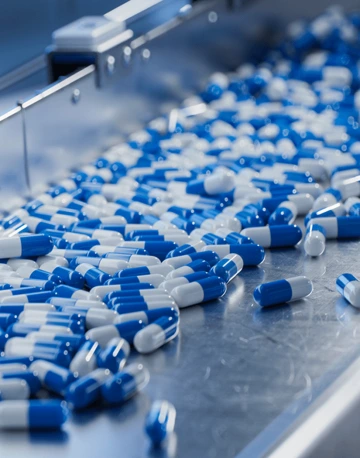Pharmaceutical Sciences
Master of Science
Quick Facts

Top 1%
of all Higher-Ed
Institutions
- Center for World University Rankings, 2024
#4
Among U.S Schools
of Pharmacy in NIH Funding
- The Blue Ridge Institute for Medical Research
Are you looking to pursue career advancement or explore future academic opportunities in the health sciences? The Master of Science in Pharmaceutical Sciences (MSPS) aims to provide you with a foundation in pharmaceutical sciences, pharmacology, and toxicology. Graduating from this program prepares you to pursue a rewarding career in the analysis of pharmaceutical quality, clinical pharmacology and translational research, research and discovery, quality control and assurance, and many more.
The program's major objective is to train students to become scientists in various areas of Pharmaceutical Sciences. Research is not required for the MSPS degree. You will take courses concentrating on Drug Discovery and development, pharmacology and toxicology, pharmaceutics, and health and pharmaceutical outcomes.
The average time to graduation is two years. The Graduate College allows six years to complete an MS program, but any extension beyond six years will require a petition. Courses taken in the MS program can be transferred to a PhD degree.
No thesis is required for this program, but you must complete coursework with appropriate grades and GPA and participate in seminar. Graduates of the MS in Pharmaceutical Sciences go on to find employment in pharmaceutical and biotechnology companies, universities, regulatory agencies such as the Food and Drug Administration, and national laboratories such as the National Institutes of Health.
Students may not transfer graduate credit into the online MSPS program and must complete all 30 credits with the University of Arizona.
Students in this MS program must receive a "B" or better grade in all required courses, or the non-passing course must be repeated. A "C" or less grade in a required course constitutes grounds for dismissal from the Graduate Program.
A student may petition the Pharmaceutical Sciences Executive Committee to waive the repeat requirement.
Credits earned in this program can be applied towards a PhD in Pharmaceutical Sciences.
*Residents of some U.S. Territories may not be eligible. Please see our Eligibility & State Authorization page for more information.
A minimum of 30 coursework units in the major subject area must be completed, including three seminar units and two units for the final semester presentation, which will be counted toward the student’s Plan of Study. Core courses include:
This course is designed for students in the College of Pharmacy who are pursuing a graduate degree in one of three program tracts, which includes Pharmacology & Toxicology, Drug Discovery & Development, and Pharmaceutics & Pharmacokinetics. The course will present basic principles that underlie each of these program tracts and provide a basis for more advanced work in these areas of study.
This class introduces sampling techniques and analytical methods to measure environmental contamination in the air, water, soils, and food—emphasizing instrument selection and quality control, including documentation, calibration, and sample management.
This three-credit, team-taught course is offered by the faculty of the Department of Pharmacology and Toxicology of the College of Pharmacy and other invited speakers. This course will cover essential laboratory techniques that are used in the fields of medicinal chemistry, pharmacology, and pharmaceutics.
Learn the principles of molecular signaling regulating membrane, cytoplasmic, and nuclear events in eukaryotic cells. Topics include extracellular signals, intracellular transduction pathways, modulation of cell signaling, and biological processes controlled by specific signaling pathways.
This will be a two-unit team-taught introductory course offered by the faculty of the Drug Discovery and Development (DDD) and Pharmacology/Toxicology (PharmTox) graduate tracks of the College of Pharmacy. The course is intended to familiarize first-year graduate or senior undergraduate students with (i) critical concepts of drug discovery, (ii) the inclusion of basic pharmacological principles, and (iii) exemplary molecular therapeutics of historical and contemporary importance.
Survey of environmental chemicals' tissue and organ system effects. Introduction to adsorption, distribution, metabolism, and elimination of chemicals; toxicology of liver, lung, kidney, central nervous system, skin, reproductive systems, hematopoietic system, and immune system. Introduction to carcinogenesis and developmental toxicology.
PCOL 596a covers developing and exchanging scholarly information, usually in small groups. The scope of work shall consist of research by course registrants, with the exchange of the results of such research through discussion, reports, and/or papers. This course is accompanied by PCOL 596e.
This course introduces basic extracorporeal techniques by discussing blood-propelling devices, heat transfer, gas transfer, bio-materials, and perfusion pharmacology.
Outcomes
Skills
Earning your Master of Science in Pharmaceutical Sciences will build core skills, including:
- Analytical skills
- Critical thinking
- Data analysis & interpretation
- Method development
- Operational understanding
- Organizational knowledge
- Regulatory skills
- Research skills
- Scientific knowledge
- Scientific literacy
- Teamwork
Potential Career Paths
Graduates of the Master of Science in Pharmaceutical Sciences will be prepared to pursue careers in the following fields:











